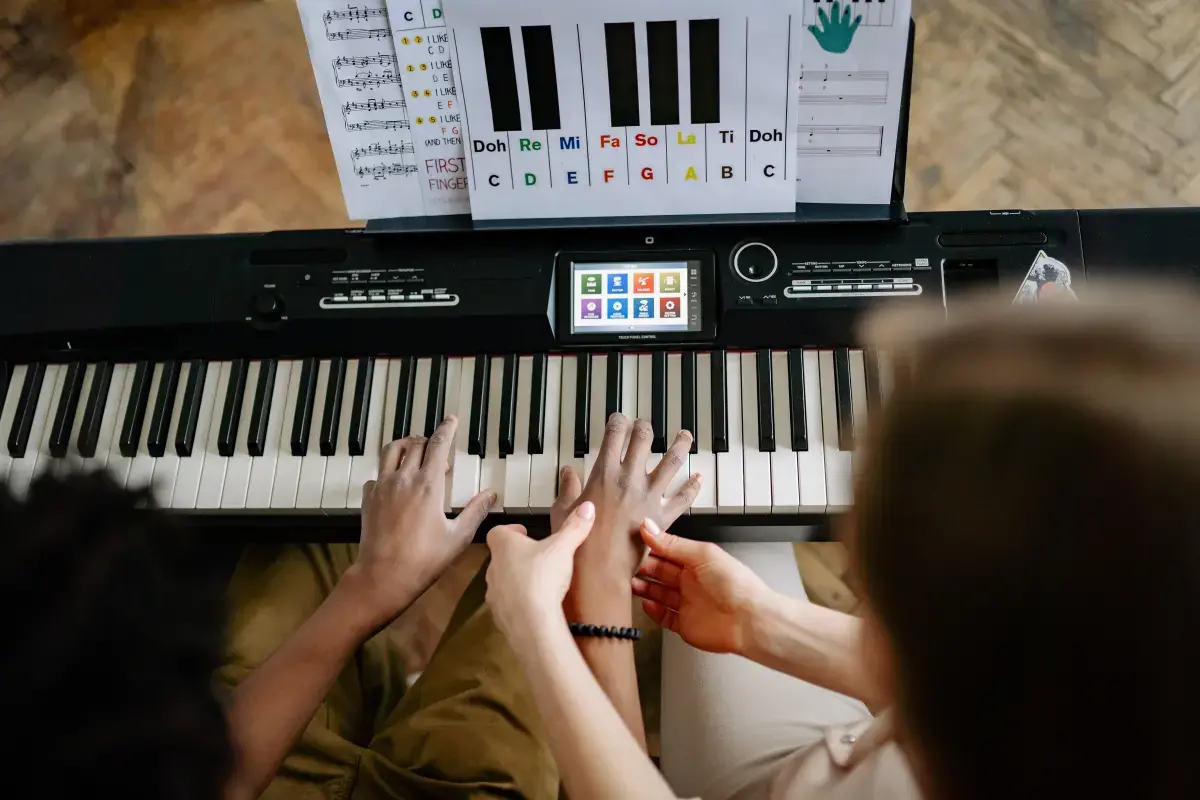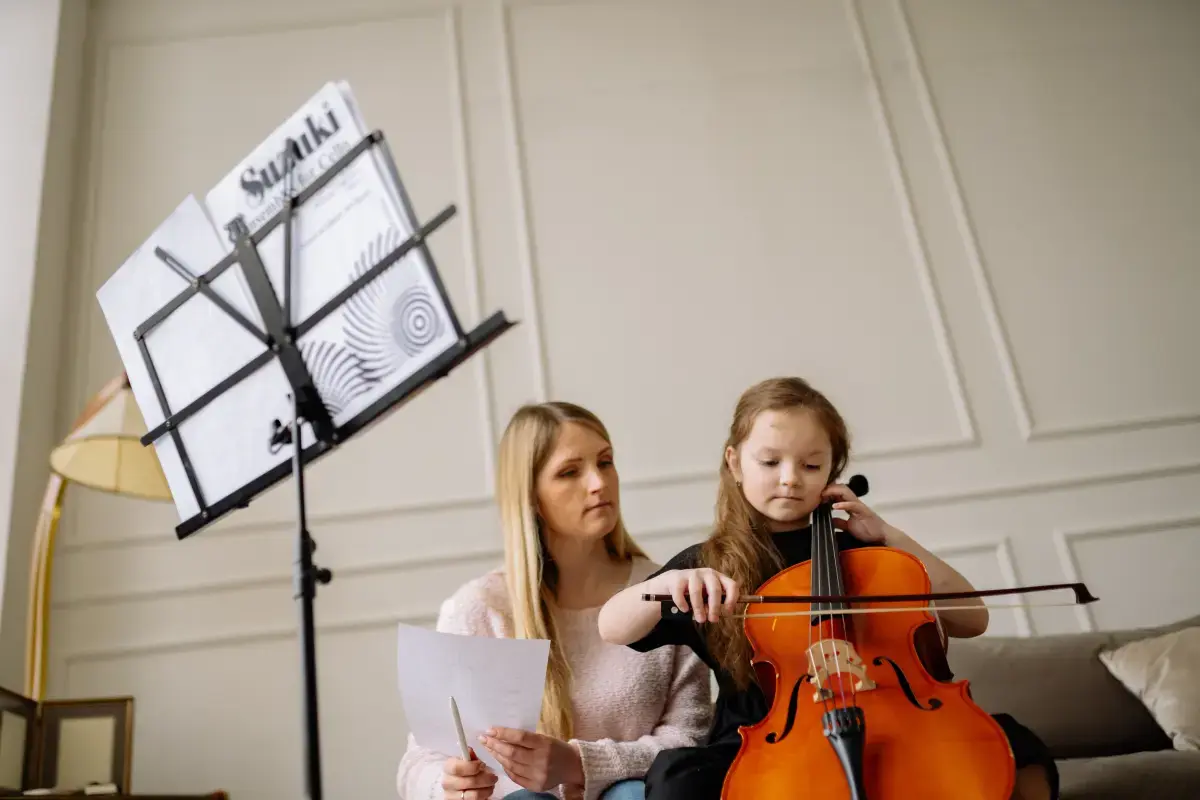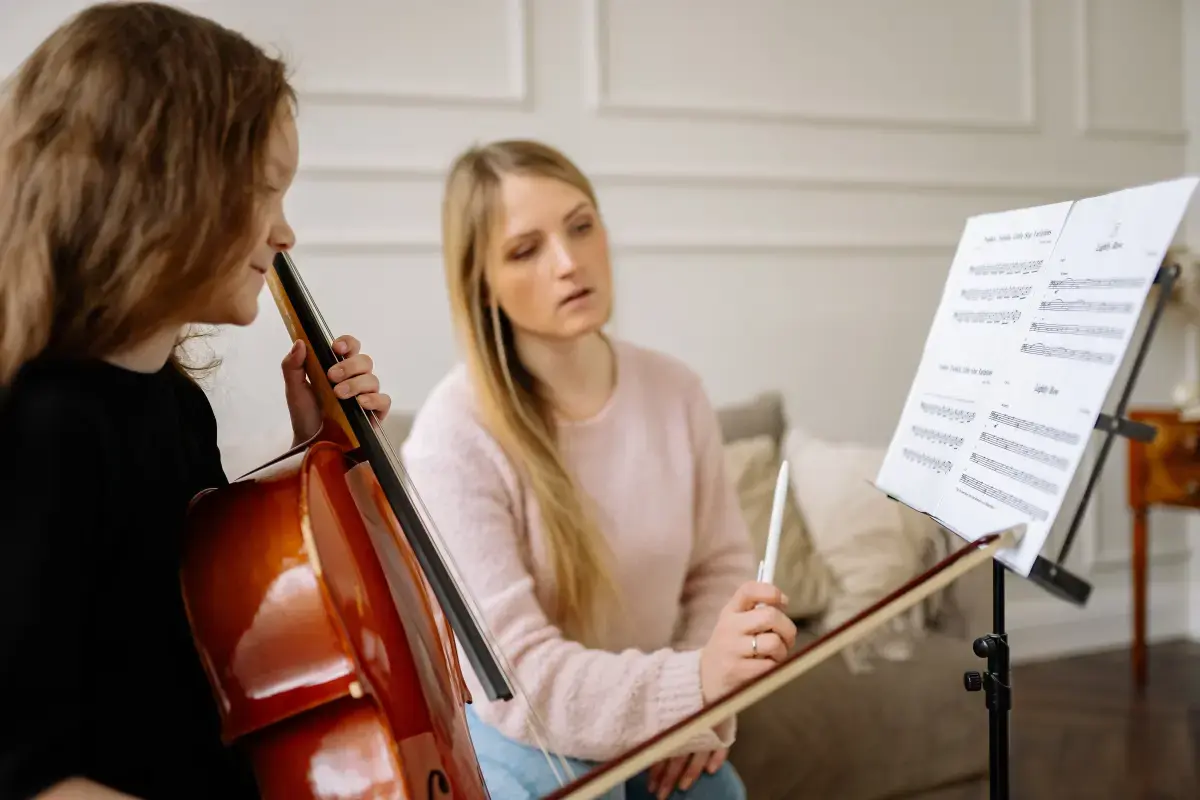
Music Teacher Job Description
What is a Music Teacher Professional?
A music teacher is someone who teaches people how to play musical instruments and sing. They often work in schools, but they can also work in other settings such as private homes, studios, or community organizations. Music teachers typically have a passion for music and want to share their knowledge with others. The job of a music teacher can vary depending on the setting in which they work. In general, music teachers provide instruction on how to read sheet music, play various musical styles, and improve one’s overall technique.

What does a Music Teacher Expert do?
They may also give students feedback on their playing or singing, help them prepare for performances or auditions, and select repertoire that is appropriate for their skill level. Music teachers typically have a bachelor’s degree in music education or performance. Some states require music teachers to be licensed in order to teach in public schools. Many music teachers continue their education by taking courses or attending workshops on specific topics related to their field.

What are the Skills of a Music Teacher?
A music teacher needs a number of skills and experience in order to be successful. Firstly, they need to have a thorough knowledge of the subject matter. Secondly, they should be able to communicate effectively with their students.

What makes an Expert Music Teacher?
Thirdly, they should have the ability to engage and motivate their students. Fourthly, they should be able to create an enjoyable and supportive learning environment. Finally, they should have the patience and commitment required to support their students through the ups and downs of learning an instrument or developing their musical abilities.

What level of Experience & Qualifications are required to be a Music Teacher?
Industry Experience: • Minimum of 3-5 years teaching experience in music. • Must have a good understanding of the various musical styles and genres, both modern and traditional. • Ability to teach different instruments such as guitar, piano, drums etc. Training & Qualifications: • Bachelor’s degree or higher in Music Education is preferred but not required. • Completion of an accredited course/program in music education (e.g., Kodaly or Orff). • Teaching certification from state board of education if applicable to your area. Education: • Knowledgeable about contemporary pedagogy methods for effective instruction at all levels (beginner through advanced). • Understanding of basic music theory and ability to explain concepts clearly and concisely to students. • Ability to work with children as well as adults on their individual goals/needs within the framework of group lessons/ensembles when necessary.

What is the Salary of a Music Teacher?
The salary expectations of a music teacher can vary greatly depending on the type and level of teaching being done. For example, a junior music teacher may expect to earn anywhere from $20,000-$40,000 per year while a more experienced senior music teacher could make up to $60,000 or higher annually. For those just starting out in the field as an entry-level or part-time instructor, salaries may range from around $15/hour for private lessons to upwards of $25/hour for group classes. As instructors gain experience and further their qualifications with advanced degrees or certifications in teaching methods such as Orff Schulwerk (a specialized approach to musical instruction) they can command much higher wages and move into leadership positions at schools or universities where salaries often exceed six figures. In addition to base pay, many teachers also receive bonuses based on performance evaluations which can significantly increase overall earnings potential. Other benefits may include tuition reimbursement for continuing education courses related to teaching music and additional compensation for leading workshops and clinics outside of regular class hours.

What are the Working Conditions for a Music Teacher?
The working conditions for a music teacher vary significantly depending on the type of job and setting. Generally, music teachers must have excellent communication skills and be comfortable teaching students from diverse backgrounds. Additionally, they should have extensive knowledge of musical theory and history as well as an understanding of various instruments. Music teachers typically work in schools or private studios to teach individual lessons or group classes. They may also offer workshops, lectures, or masterclasses in their area of expertise. In addition to teaching duties, some music teachers are responsible for organizing concerts and recitals for their students; coordinating student performances at festivals; preparing materials for class sessions; evaluating student progress; developing individualized lesson plans based on each students needs; attending meetings with other faculty members or school administrators; collaborating with other departments such as theatre arts or visual arts when necessary; maintaining accurate attendance records and grades; purchasing supplies related to instruction such as sheet music, instrument repairs/maintenance etc.; keeping up-to-date on new techniques in order to stay current with industry trends; participating in professional development opportunities such as conferences where relevant topics are discussed among peers. In terms of working hours, this depends largely upon the type of position one holds (part time vs full time). However most employers require that employees keep regular office hours during which they can meet with students either individually or in groups.. Hours may also involve evening and weekend commitments due to rehearsals/concerts/recitals etc., so flexibility is key!

What are the roles and responsibilities of a Music Teacher?
Develop and implement lesson plans
Prepare students for performances and competitions
Teach technique, sight reading, and music theory
Help students develop their musical skills and talent
Encourage students to practice regularly
Select appropriate repertoire for students to learn
Hold recitals and concerts
Serve as a mentor to students
Motivate students to achieve their best
Be available to answer student questions outside of class
Evaluate student progress and give feedback
.Write letters of recommendation for college auditions or summer programs
Cooperate with other music teachers in the school or district
Plan and organize field trips to see professional performances
Compile program notes for concerts
Serve on committees at the school or district level
Stay up-to-date on new pedagogical approaches through research and professional development
Be an active member of professional organizations such as state or national music educators associations
Support school fundraisers
Adhere to all school policies

Where can I find Music Teacher jobs?
- Create a profile on gigexchange and promote your Music Teacher skills to advertise you are Open to New Work Opportunities
- Ensure your Resume (or CV), or online work profile is up to date and represents your skills and experience. Ensure your reputation reflects your ability & attitude.
- Apply for Music Teacher Jobs advertised on gigexchange.
- Practise Music Teacher interview techniques to ensure you represent your personality and ability succinctly and confidently.
- Accept the job offer if the salary meets your expectations and the employer mission and purpose reflects your core values.
Jobs
What are the best job boards for Music Tutor jobs?

How can I hire Music Teacher staff online for my business?
The best job board for recruiting Music Teacher experts is gigexchange.com. Advertise full-time, part-time or contract jobs to find, hire & recruit trusted, experienced and talented Music Teacher candidates near you.

Are Music Teacher roles in demand in 2026?
Music Teacher experts are still in high demand in 2026. If you are an experienced Music Teacher or looking to train and become one. The job market is looking strong for Music Teacher jobs near me.